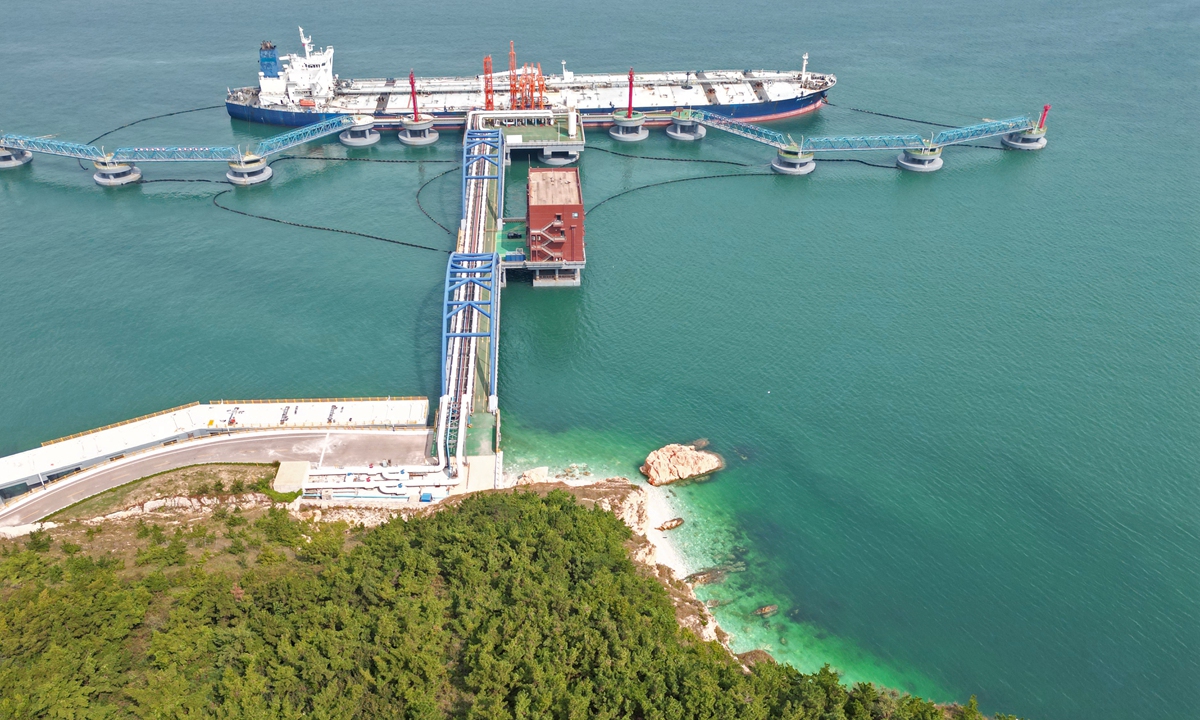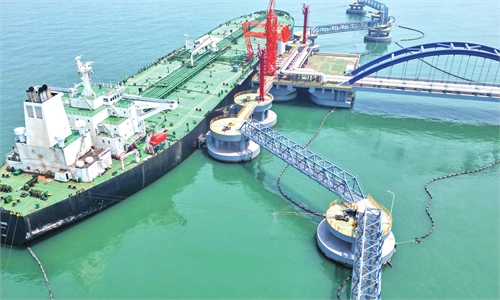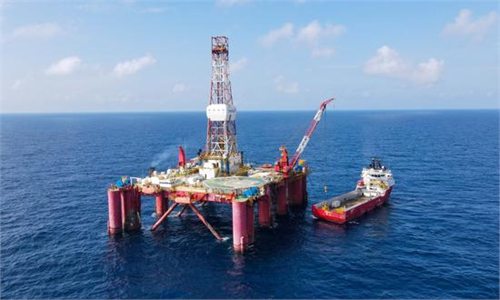China keeps oil prices unchanged, stability expected in Q4 despite global volatility

A tanker unloads oil through a pipeline at the 300,000-ton terminal in the port of Yantai, East China's Shandong Province on September 28, 2022. China imported 330.18 million tons of oil in the first eight months of 2022, down 4.7 percent year-on-year, data from the National Bureau of Statistics showed. Photo: VCG
China's top economic planner announced on Monday that the retail prices of gasoline and diesel will not be changed in October despite a week of rising global oil prices and tight supplies.
This is the first time the National Development and Reform Commission (NDRC) suspended oil price adjustment in 2022.
So far this year, the retail prices of refined oil products have been adjusted 19 times, with 11 hikes and seven cuts. Under the country's pricing mechanism, the NDRC usually adjusts prices in accordance to international crude oil prices.
The price of gasoline is up by 1,305 yuan ($182.6) per ton so far in 2022, with the diesel price up by 1,255 yuan per ton, according to the NDRC.
Although international oil prices this winter will largely reflect developments in the Russia-Ukraine conflict and the global economy, China's oil price will likely remain stable in the fourth quarter, industry insiders said.
This is due to China's oil pricing mechanism, they noted. Domestic refined oil prices are adjusted every 10 working days according to changes in the international market.
The average oil price of the first 10 working days before Monday, compared with the first 10 working days before September 21, the starting day of the last price adjustment session, was about 30 yuan per ton, which did not hit the price changing threshold of 50 yuan per ton, according to insiders.
The Organization of the Petroleum Exporting Countries (OPEC) and its non-OPEC allies, namely OPEC+, decided last week to cut production by 2 million barrels per day (about 273,970 tons).
Following the decision, international oil prices soared for five consecutive trading days.
On the New York Mercantile Exchange, the benchmark West Texas Intermediate crude rose 16.54 percent and the benchmark price on the Intercontinental Exchange Europe, Brent crude, rose 11.32 percent, both posting their biggest weekly gains in seven months.
Meanwhile, amid a global interest rate hike cycle, the economic downturn has inevitably reduced energy demand, which was the main reason for the OPEC+ production cut this time, Feng Mohan, a research fellow of macroeconomy at Beijing Fost Economic Consulting, told the Global Times on Monday.
"The production cuts of OPEC+ will boost oil prices in the short term. But oil prices are poised for a downward trend in 2023, as the actual production cut of OPEC+ is expected to be less than its agreement," said Feng.
Qu Xinrong, a research fellow at the Cheung Kong Graduate School of Business, said that although the production cut will support crude oil prices, there is little chance that international oil prices will rise above $100 per barrel.
"Domestic gasoline and diesel prices are relatively high, which pressures the downstream of industry chains. But the room for price hikes is limited," Qu told the Global Times on Monday.
Feng said that as the US midterm elections are approaching, there will be occasional news to restrain oil prices, and the room for significant hikes is limited.
The US Department of Energy on Friday awarded 10.15 million barrels of Strategic Petroleum Reserve crude for November delivery, on top of the 155 million barrels that have already been delivered.
The escalating conflict between Russia and Ukraine has also raised the prospect of higher global oil prices amid tight supplies and geopolitical fallout, analysts said.
Still, gasoline and diesel prices in China are expected to remain stable thanks to the country's efforts to ensure stable supplies and prices, analysts noted.



